HORRIFIC INQUIRY: BLACK CHRISTMAS (2019)
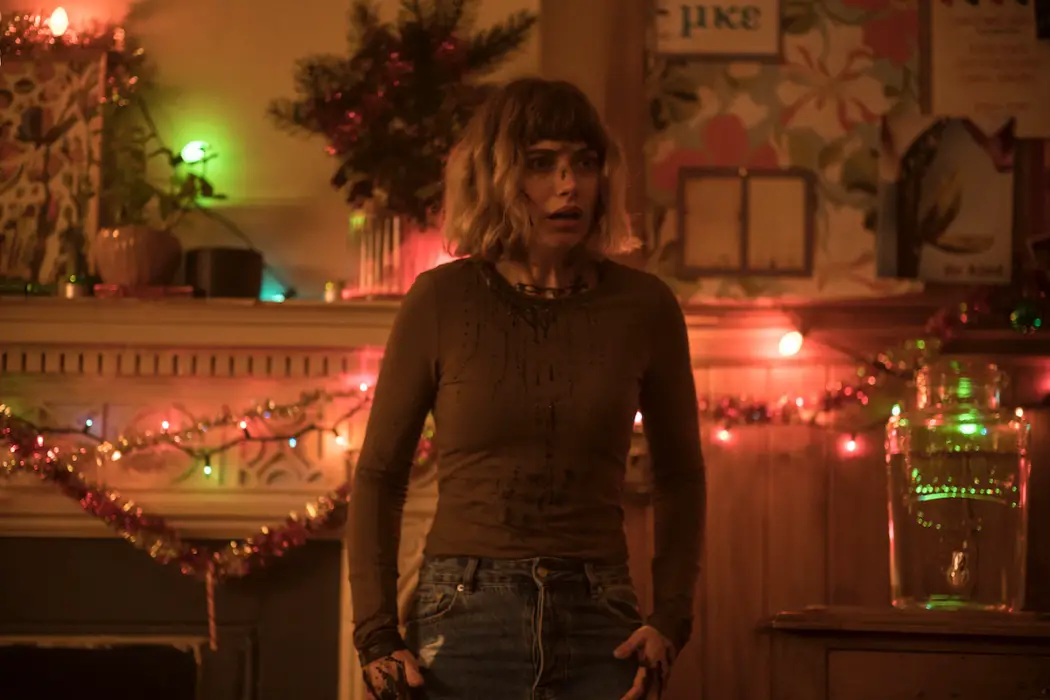
Stephanie Archer is 39 year old film fanatic living in…
Welcome back to the newest, and at times goriest, column here at Film Inquiry: Horrific Inquiry. Twice a month, I will be tackling all things horror, bringing two films back into the spotlight to terrify and frighten once more. And occasionally looking at those that could have pushed the envelope further. Join us as we dive deep into the heart of horror, but warning, there will be spoilers.
What would Christmas be without a little chill in the air? While it is hard to find a good Christmas horror to entertain, the season is not without its classics. While Anna and the Apocalypse, Better Watch Out, Krampus, and 1974’s Black Christmas immediately come to mind, this year I found myself finally diving into an old standing list of “I’ll get to it eventually”, scouring for a lesser-known, lesser watched, horror to cover for the holidays. And while I found myself drawn back to the classic, it was the 2019 remake I found myself longing to see. Because what is Christmas without a little Black Magic.
The original Black Christmas became a Christmas staple upon its release in 1974, the universal horrific image of a sorority girl with a plastic bag overheard an undeniable image of the film. Any time the film is discussed, this is the image that rings true. While the death of Clare in the original is iconic, it is only the beginning, Black Christmas diving into terror, horror, and even an ambiguous ending. For its remake, however, it leaves much to be desired, especially in gore and ambiguity, it knows exactly what message it wants to get across.
Effective Opening
While the message is not immediately apparent, the opening of Sophia Takal‘s Black Christmas is engaging, even with its formulaic execution. Beginning with an opening quote speaking to the power of man, audiences are transitioned into chants, cloaks, and imagery matching the sounds that build into its score – crackling fire, screaming, howling crying, and laughter – each sound a montage of horrific foretelling and foreboding, merging into the euphoric presence of Christmas. As the darkness melts away, viewers are left with the warmth of the season, the fire and decorations surrounding the sorority gift exchange heightening the holiday feeling. In this moment, it is safe.
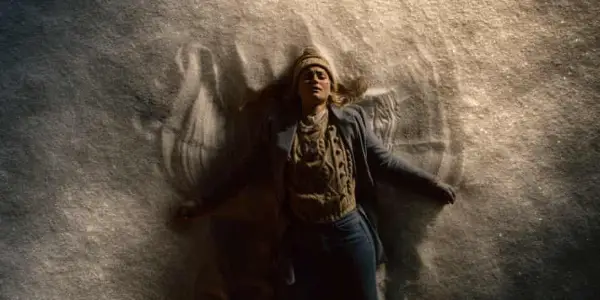
While the group celebrates, Lindsey (Lucy Currey) is shown alone, at night walking through campus. While she reassures her friend she is fine, heading home early for winter break, trained viewers know she is to be the film’s first victim. As she ends her call, her phone lights up with a DM (Direct Message) from Calvin Hawthorne, ironically the same name as the college campus’s founder. Comparing a sorority girl to a pig, as they both squeal before dying, there is an all too familiar imagery presented, Lindsey followed by an unknown man as she puts her keys between her fingers in prepared defense. While the man proves to pose no threat, there is the understanding Lindsey is not offered the privilege of giving him the benefit of the doubt.
It is the second time in the film’s short runtime so far that the power of men is laid out to its audience, both in Black Christmas’s opening quote and here, in the power of fear they both intentionally and unintentionally create. It’s an intense opening that is immediately met with terror and violence, validating Lindsey’s fear and our understanding. In almost a superhuman strength of power and speed, Lindsey is attacked by a cloaked figure, stabbed to death with an icicle and dragged away – the formation of a snow angel transformed into a hideous Angel of Death. It is an effective opening that is certain to garner the attention of its audience, even with its predictability.
From Power to Abuse… The Theme Continues
As we leave Lindsey behind, viewers are introduced to Riley (Imogen Poots) as she is awoken by a pure white cat that inhabits the sorority house. As she maneuvers through the home, we meet her fellow sisters, each giving a taste of sorority life and the bonds they each share. But it is not only the people she interacts with but also the environment. As she makes her way to class, there is a feeling of tradition and age that reverberates from the architecture of the school, speaking not only to its age but history. There is old blood that runs through the halls of the campus, with traditions that date back decades.
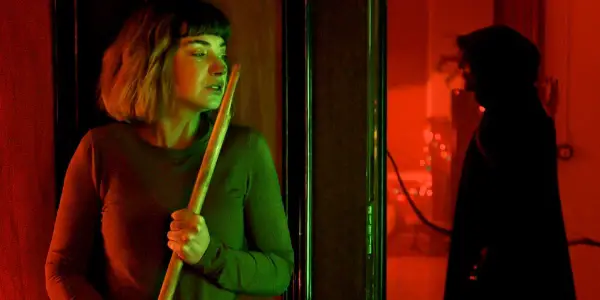
Viewers next find Riley in class, Professor Gelson (Cary Elwes) reading a passage from a book, his action of pointing Riley out to analyze the passage feeling intentional and targeted. There is an uneasiness that arises from Riley, one he not only takes advantage of but builds upon. As he proves that gender can not be determined by the literary work itself, he takes it one step further, using the moment as a means to exert power. As it is revealed, there is a petition against him by fellow sorority girl Kris (Aleyse Shannon) as his syllabus only contains classics written by white men. Having won a petition to have the head of the college, founder Calvin Hawthorne removed from public view because of his abuse and slavery practices, Kris has set her sights on making changes within the teaching staff itself.
While the moment continues to solidify Cary Elwes as a continuing face in horror, it also grounds the film’s continuing message of men with power – and their abuse of it. Here, fear is used as a tactic, isolating a student, a female student, to prove why he is in the right and others are wrong. His power as a professor and an educated man is wielded and allowed in a classroom, in front of an audience – and there is the feeling there is nothing Riley can do.
One Size Does Not Fit All
As Black Christmas moves along, we come to understand that Riley was the victim of sexual assault by one of the men at the DKO Fraternity – an assault that no one but her sorority sisters believed happened. As she is still recovering from the trauma, an opportunity rises, presenting Riley with a chance to not only to face her assailant but to claim her power back. And she does. But not without more examples of the power of men. Comments of “boys will be boys”, girls criticized for being teased in the bedroom, and continued murders as each girl is isolated continue the theme of men – their power and abuse.
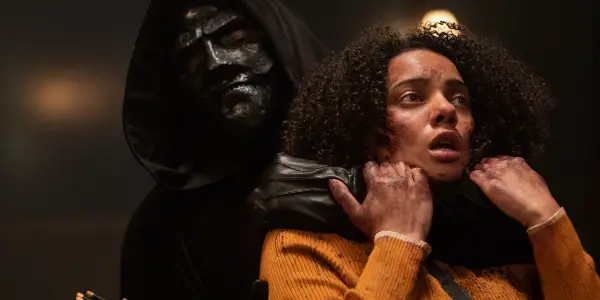
And while the film pushes this idea, it is also aware that it can not be a blanket film, acknowledging we can not speak to the behavior of all men as the same. As the girls call out the behavior of men – specifically and at times more generically – Marty’s (Lily Donoghue) boyfriend Nate (Simon Mead) lashes out at the group, accusing them of approaching men with a one lens perspective. That not all men are bad, or behave that way. It is an awareness within the film that makes its at times in your face messaging wholesome and complete. While men can categorize women in such a way, so too can women. It is important to know and recognize that there is not a one-size-fits-all.
Black Christmas goes one step further as well with the introduction of Landon (Caleb Eberhardt), who is challenged to behave stereotypically but pushes through the societal norms and expectations to stand with the sorority girls in their final battle. As Nate reflects that one size does not fit all, Landon represents the boy raised by stereotypes, tradition, and expectation – and saying no. He fights back, proving to Riley, and us, that just because society tells you how to behave and see the world, you have the choice to turn your back on it and aspire to be the person you want to be.
The Final Girl…S
There is a unity within Black Christmas that rings through to the end of the film. Like ants, the girls work together, as a community. They pledged into a group, and die with it as well. They try relentlessly to save one another, giving their lives for their fellow sisters. As the film progresses, this unity and feeling of community are expanded, each girl that survives the night unifying. No longer are they divided by their individual sorority, rather unifying as women to protect women. As they take down the colleges deeply engrained patriarchy, one that has attempted to arise from the ashes to correct the behavior of women, there is a feeling Black Christmas is not speaking as much of a fictional story as it should be.
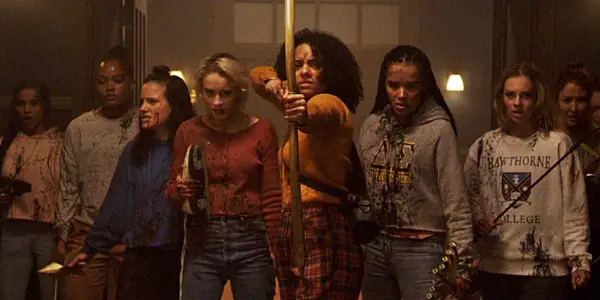
As we enter 2022, women around the world are still fighting for their rights – with much of the fight not just to obtain, but retain. As this film was released in 2019, there is a feeling of the messaging of The Handmaid’s Tale vibrating through the core of the film. A call to fight, to push back, to be strong. Yet, where The Handmaid’s Tale found praise in its execution, Black Christmas is too in your face to make the same impact. It is unfortunate as the messaging is just as important and relevant. Too often the film literally spells out its message, leaving finesse and art behind. Horror cliches abound, stripping away a lot of the power and potential of Black Christmas.
Yet, as the messaging fails to find its effect, there is a more subtle take that did find its potent punch. Horror is known for the final girl – the one who survives. While there are instances of more than one girl surviving, it is not typically a group. Black Christmas presents its audience with girls that not only fight and win, but do it together, with no casualties in the film’s final moments. There is no great sacrifice in the name of women and the downfall of men. Rather, it is a group of women, taking a stand and seeing the other side of the fight -together.
Conclusion: Black Christmas
No, Black Christmas is not the knock-out holiday film you might be craving, but it entertaining to say the least. While it drags at times in its pace, lacks gore that would attract the classic horror buff, and is too in your face with its messaging, it still finds strength in the women it is committed in depicting.
Have you seen Black Christmass? What did you think? Let us know in the comments below!
Watch Black Christmas
Does content like this matter to you?
Become a Member and support film journalism. Unlock access to all of Film Inquiry`s great articles. Join a community of like-minded readers who are passionate about cinema - get access to our private members Network, give back to independent filmmakers, and more.













